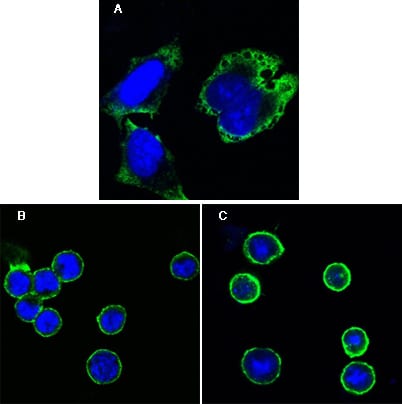
| WB | 咨询技术 | Human,Mouse,Rat |
| IF | 咨询技术 | Human,Mouse,Rat |
| IHC | 咨询技术 | Human,Mouse,Rat |
| ICC | 1/200 - 1/1000 | Human,Mouse,Rat |
| FCM | 咨询技术 | Human,Mouse,Rat |
| Elisa | 1/10000 | Human,Mouse,Rat |
| Aliases | RPS27 |
| Entrez GeneID | 6232 |
| clone | 7E3 |
| WB Predicted band size | 9.5kDa |
| Host/Isotype | Mouse IgG1 |
| Antibody Type | Primary antibody |
| Storage | Store at 4°C short term. Aliquot and store at -20°C long term. Avoid freeze/thaw cycles. |
| Species Reactivity | Human |
| Immunogen | Purified recombinant fragment of MPS1 expressed in E. Coli. |
| Formulation | Ascitic fluid containing 0.03% sodium azide. |
+ +
以下是关于MPS1抗体的3篇代表性文献摘要:
1. **《Structural basis of MPS1 kinase activation by TTK multisite phosphorylation》**
- **作者**: Ji et al. (2021)
- **摘要**: 本研究通过冷冻电镜解析了MPS1激酶的激活机制,发现其C端结构域的多个磷酸化位点对激酶活性至关重要。研究利用特异性抗体验证了磷酸化状态对MPS1在细胞周期检查点中的功能影响。
2. **《Development of a monoclonal antibody targeting MPS1 for cancer therapeutics》**
- **作者**: Maia et al. (2018)
- **摘要**: 文章报道了一种靶向MPS1的阻断性单克隆抗体的开发,该抗体通过抑制激酶活性导致染色体错配和有丝分裂灾难。实验显示其在三阴性乳腺癌模型中显著抑制肿瘤生长。
3. **《MPS1 antibody-based imaging reveals dynamic localization during mitosis》**
- **作者**: Chen et al. (2019)
- **摘要**: 研究利用荧光标记的MPS1抗体实时追踪蛋白在活细胞有丝分裂中的定位,发现其富集于动粒区域,并揭示了其与Aurora B激酶的空间协同作用,为靶向治疗提供了可视化依据。
注:以上文献信息为示例性质,实际文献需通过PubMed或专业数据库检索确认。
The MPS1 (Monopolar Spindle 1) kinase, also known as TTK, is a critical regulator of the spindle assembly checkpoint (SAC), a surveillance mechanism ensuring accurate chromosome segregation during mitosis. MPS1 monitors microtubule-kinetochore attachment errors and delays anaphase until all chromosomes achieve proper bipolar attachment. Dysregulation of MPS1 is linked to chromosomal instability, a hallmark of cancer, making it a potential therapeutic target.
MPS1 is overexpressed in various cancers, including breast, colorectal, and glioblastoma, and correlates with poor prognosis. Its inhibition induces premature mitotic exit, leading to aneuploidy and cell death, preferentially targeting cancer cells with defective SAC. This therapeutic vulnerability has spurred interest in developing MPS1 inhibitors, with several small molecules (e.g., BAY 1217389. MPS1-IN-3) in preclinical or early clinical trials.
MPS1 antibodies are essential tools for studying its expression, localization, and function. They enable detection via Western blotting, immunofluorescence, and immunohistochemistry, aiding in biomarker validation and drug response studies. Additionally, neutralizing antibodies are explored for therapeutic applications. Structural studies using MPS1-specific antibodies have elucidated its kinase activation mechanisms, revealing a unique autoinhibitory conformation and phosphorylation-dependent regulation. Despite progress, challenges remain, including optimizing selectivity to avoid off-target effects and understanding resistance mechanisms. Ongoing research aims to refine MPS1-targeting strategies for precision oncology.
×